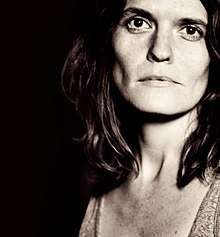Rebecca Gayle Howell
Rebecca Gayle Howell (born August 10, 1975 in Lexington, Kentucky)[1] is an American writer and translator.[2]
Rebecca Gayle Howell | |
|---|---|
 | |
| Born | August 10, 1975 Lexington, Kentucky |
| Occupation | Writer |
| Nationality | American |
| Literary movement | Southern |
Education and career
Howell was born to a working-class family in Lexington, Kentucky on August 10, 1975. She earned her BA and her MA at the University of Kentucky, her MFA at Drew University, and her PhD at Texas Tech University. Howell also apprenticed under the Southern experimental art photographer and writer James Baker Hall, as well as the feminist poet and critic Alicia Ostriker. Other mentors include Carolyn Forché, Nikky Finney, Gerald Stern, Wendell Berry, and Jean Valentine. Among her awards is a 2014 Pushcart Prize,[3] a Mellon Foundation fellowship from United States Artists, and two poetry fellowships from the Fine Arts Work Center.
In 2014, she joined the staff of The Oxford American as Poetry Editor.[4] From 2017-2019, she served as the James Still Writer-in-Residence at Hindman Settlement School. In 2019 she became a Senior Lecturer in the Lewis Honors College at the University of Kentucky.
Awards
- 2019 United States Artists Fellow.
- 2016 The Sexton Prize. For American Purgatory.
- 2016 Al Smith Individual Artist Fellowship, Kentucky Arts Council.[5]
- 2014 Pushcart Prize. XXXIX. Best of the Small Presses. Edited by Bill Henderson.[6]
- 2014 Poetry Fellow, 2nd year. Fine Arts Work Center. Provincetown, MA.
- 2012 Cleveland State University Poetry Center First Book Prize. For Render /An Apocalypse.[7]
- 2012 Finalist, Best Translated Book Award. Three Percent. For Hagar Before the Occupation / Hagar After the Occupation. Alice James Books.[8]
- 2010 Poetry Fellow. Fine Arts Work Center. Provincetown, MA.
Books
- American Purgatory, poems by Rebecca Gayle Howell. (Eyewear Publishing, 2017).
- Render / An Apocalypse, poems by Rebecca Gayle Howell. (Cleveland State University Poetry Center, 2013).
- Hagar Before the Occupation / Hagar After the Occupation, poems by Amal al-Jubouri and translated by Rebecca Gayle Howell with Husam Qaisi. (Alice James Books, 2011).
References
- "Book: The complicated animal". Leo Weekly.
- "Andrew C. Gottlieb Reviews Render: an Apocalypse, by Rebecca Gayle Howell". Terrain.org
- http://www.rattle.com/poetry/my-mother-told-us-not-to-have-children-by-rebecca-gayle-howell/
- http://www.oxfordamerican.org/item/444-hands-in-bleach
- "http://kentucky.gov/Pages/Activity-stream.aspx?n=KentuckyArtsCouncil&prId=52". kentucky.gov. Retrieved March 29, 2017. External link in
|title=(help) - http://www.rattle.com/poetry/my-mother-told-us-not-to-have-children-by-rebecca-gayle-howell/
- Schmeltzer, Michael. "CUTBANK REVIEWS: “Render/An Apocalypse” by Rebecca Gayle Howell"
- http://www.rochester.edu/college/translation/threepercent/index.php?id=3899
- Render / An Apocalypse By Rebecca Gayle Howell – The Rumpus.net
- Fifty Word Friday: Render / An Apocalypse by Rebecca Gayle Howell | Ostrich Review
- Book Review: Render / An Apocalypse | Gulf Stream Literary Magazine